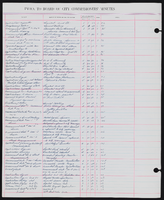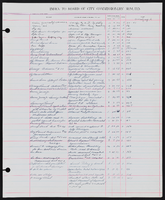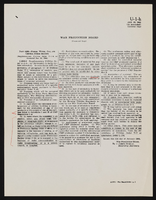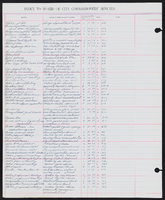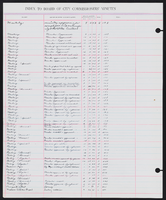Search the Special Collections and Archives Portal
Search Results
Marta and Pedro Ortiz Family Papers
Identifier
Abstract
The Maria and Pedro Ortiz Family Papers (approximately 1950-2024) contain documents, photographs, and oral histories that document the Ortiz family's experience as a migrant family living in Southern Nevada. The photographs depict family gatherings, celebrations, work life as migrant farm laborers, and the Moapa Valley region of Nevada. The papers included in the collection include earning statements and pay stubs for Pedro Ortiz Sr., letters of recommendation from the family's employer (Paul and Mitzi Ozaki), correspondence, and funeral programs and prayer cards for various family members and community members. Oral history interviews with Ortiz family members document their experiences growing up in a family of migrant farm workers, living in Logandale, Nevada, and being a part of the Latino community in Southern Nevada.
Archival Collection
Whaley, Eva Poole
Eva Poole Whaley was born on November 22, 1942 in Fordyce, Arkansas. She moved to Las Vegas, Nevada in the early 1960s. She worked in the Clark County School District. She and her husband were restaurant owners before Eva worked at Nevada Power, and then for the telephone company.
Person

Transcript of interview with Doug Unger by Barbara Tabach, August 26, 2014
Date
Archival Collection
Description
Interview with Doug Unger by Barbara Tabach on August 26, 2014. In the interview, Unger discusses his schooling, his family's mattress business, and his endeavors in the company and the mattress industry in Las Vegas. Unger becomes involved in Holocaust education and the Sperling Kronberg Mack Holocaust Resource Center.
Doug Unger was born in Cleveland, Ohio, and grew up working summers in a mattress factory, a family business started by his maternal grandfather. After graduating from high school in Cleveland, Doug attended the University of Cincinnati until moving to Steamboat Springs, and enrolled in Denver University, though ended his college career one class away from graduation. Eventually, Unger moved back to Cleveland, then to Las Vegas. In 1976, Dough bought Supreme Mattress and moved to Las Vegas to build his new business. Outside his successful career, Doug was always an active member in the city's Jewish community. He joined Congregation Ner Tamid, where he was a trustee. He became involved with the Jewish Federation, serving as treasurer and later as president. When he moved to Reno, Doug joined Temples Sinai and Emanu-el, and also became heavily involved with Guide Dogs for the Blind Friends Committee, serving as its director for a period of time. He was also the co-chair of the Governor's Advisory Council on Education Related to the Holocaust (GAC). Doug was instrumental in establishing the Library for Holocaust Studies as a successful organization, independent of the Jewish Federation. The Library is now located in its own, donated space, run by trained staff, and receives $200,000 from the state biennially.
Text

